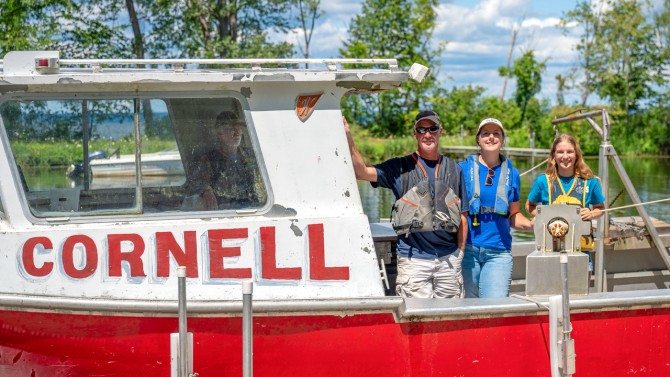
Krystal Dixon ’24 spent her summer working researching lake sturgeon at the Cornell Biological Field Station on Oneida Lake.
CCE interns’ summer projects celebrated at reception
By Melissa Jo Hill
The work and accomplishments of 19 Cornell Cooperative Extension (CCE) summer interns were celebrated at a reception, held Sept. 26 in the Biotechnology Building.
From sturgeon research on Oneida Lake, to experimental rice trials in Freeville and Candor, New York, to investigating tick-protective clothing children will actually want to wear, the CCE summer intern program matches Cornell faculty and staff with CCE associations and programs across New York state to engage students in immersive summer internship projects.
Faculty are from the College of Agriculture and Life Sciences (CALS) and the College of Human Ecology (CHE), along with priority projects of the David M. Einhorn Center for Community Engagement.
“Cornell Cooperative Extension exists to create these connections and offer these opportunities – not just to our undergraduate students at Cornell, but to the county associations and communities across New York who benefit from their insights, talent and energy every summer,” said Jenny Kao-Kniffin, CCE interim director.
“The mission of our college, simply put, is to leave the world a better place than we found it,” said Ben Houlton, the Ronald P. Lynch Dean of CALS. “We do this by going beyond the boundaries of campus, partnering with communities to explore ideas and solve complex problems. Through this important program, communities gain access to our talented undergraduates and our interns see the impact of putting knowledge to work to support our state’s economy and communities.”
Krystal Dixon ’24, spent her summer working alongside CCE and New York Sea Grant Fisheries Specialist Stacy Furgal on lake sturgeon research at the Cornell Biological Field Station on Oneida Lake.
“Growing up in New York as an avid angler, I have always had a special interest in fish,” Dixon said. “However, it wasn’t until I took a class in fish ecology at Cornell that I realized fish were something I had a passion for. When I visited the Cornell Biological Field Station for the first time during that class, I knew I had to spend a summer here.”
Dixon participated in a research survey, and created extension and outreach educational materials on lake sturgeon. “When I got to see a sturgeon for the first time, that opened my world,” she said. “It’s been a great experience for me. It really solidified my interest in working in fisheries.”
“CCE internships are a demonstration of our university’s promise and our contract college’s commitment to share what is learned here with the people of New York,” said Anthony Burrow, CHE’s associate dean for outreach and extension. “That the students here so genuinely embody that promise and that commitment by delivering their good works through these internships is not only meaningful, but critical for realizing our purpose.”
Anjali Anbu ’26, a global public health sciences major, said she’s interested in clinical medicine and public health. “The opportunity to do community-based participatory research this early in my Cornell career has really shaped my interest in research as a whole,” she said.
Anbu worked with Janet Loebach, the Evalyn Edwards Milman Assistant Professor in Child Development (CHE) and director of the DECA Lab (Design Environments with/for Children & Adolescents), and CCE Rockland County 4-H educator Kristen Ruggiero to recruit young people to test a youth-delivered environmental assessment tool. The internship stressed field research methodology; organization and communication; and synthesizing and reporting on data.
Said Anbu: “I’m excited to take the tools and methods and overall lessons I learned from working with CCE forward with me in my career as a researcher and doctor.”
Melissa Jo Hill is communications specialist and writer with Cornell Cooperative Extension.
Media Contact
Get Cornell news delivered right to your inbox.
Subscribe


